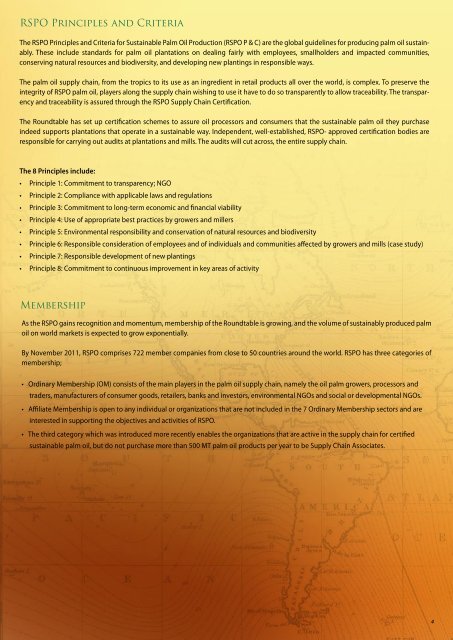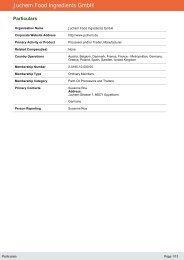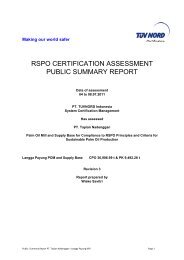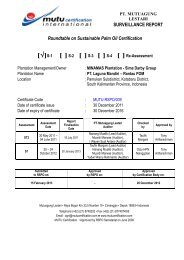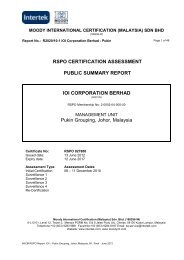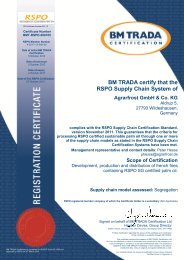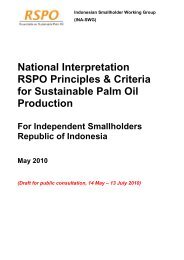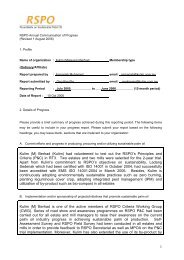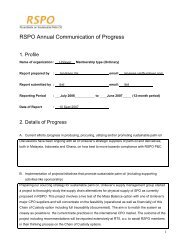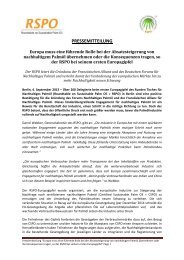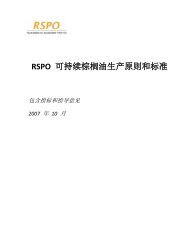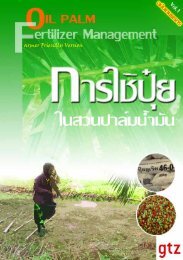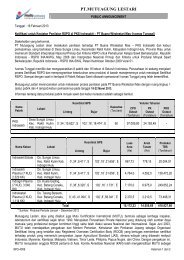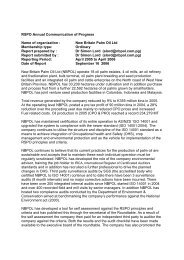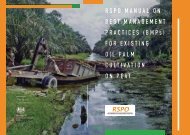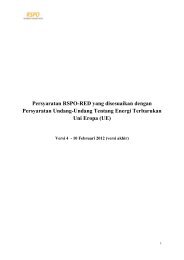FACTSHEET - Roundtable on Sustainable Palm Oil
FACTSHEET - Roundtable on Sustainable Palm Oil
FACTSHEET - Roundtable on Sustainable Palm Oil
Create successful ePaper yourself
Turn your PDF publications into a flip-book with our unique Google optimized e-Paper software.
RSPO Principles and Criteria<br />
The RSPO Principles and Criteria for <strong>Sustainable</strong> <strong>Palm</strong> <strong>Oil</strong> Producti<strong>on</strong> (RSPO P & C) are the global guidelines for producing palm oil sustainably.<br />
These include standards for palm oil plantati<strong>on</strong>s <strong>on</strong> dealing fairly with employees, smallholders and impacted communities,<br />
c<strong>on</strong>serving natural resources and biodiversity, and developing new plantings in resp<strong>on</strong>sible ways.<br />
The palm oil supply chain, from the tropics to its use as an ingredient in retail products all over the world, is complex. To preserve the<br />
integrity of RSPO palm oil, players al<strong>on</strong>g the supply chain wishing to use it have to do so transparently to allow traceability. The transparency<br />
and traceability is assured through the RSPO Supply Chain Certificati<strong>on</strong>.<br />
The <str<strong>on</strong>g>Roundtable</str<strong>on</strong>g> has set up certificati<strong>on</strong> schemes to assure oil processors and c<strong>on</strong>sumers that the sustainable palm oil they purchase<br />
indeed supports plantati<strong>on</strong>s that operate in a sustainable way. Independent, well-established, RSPO- approved certificati<strong>on</strong> bodies are<br />
resp<strong>on</strong>sible for carrying out audits at plantati<strong>on</strong>s and mills. The audits will cut across, the entire supply chain.<br />
The 8 Principles include:<br />
• Principle 1: Commitment to transparency; NGO<br />
• Principle 2: Compliance with applicable laws and regulati<strong>on</strong>s<br />
• Principle 3: Commitment to l<strong>on</strong>g-term ec<strong>on</strong>omic and financial viability<br />
• Principle 4: Use of appropriate best practices by growers and millers<br />
• Principle 5: Envir<strong>on</strong>mental resp<strong>on</strong>sibility and c<strong>on</strong>servati<strong>on</strong> of natural resources and biodiversity<br />
• Principle 6: Resp<strong>on</strong>sible c<strong>on</strong>siderati<strong>on</strong> of employees and of individuals and communities affected by growers and mills (case study)<br />
• Principle 7: Resp<strong>on</strong>sible development of new plantings<br />
• Principle 8: Commitment to c<strong>on</strong>tinuous improvement in key areas of activity<br />
Membership<br />
As the RSPO gains recogniti<strong>on</strong> and momentum, membership of the <str<strong>on</strong>g>Roundtable</str<strong>on</strong>g> is growing, and the volume of sustainably produced palm<br />
oil <strong>on</strong> world markets is expected to grow exp<strong>on</strong>entially.<br />
By November 2011, RSPO comprises 722 member companies from close to 50 countries around the world. RSPO has three categories of<br />
membership;<br />
• Ordinary Membership (OM) c<strong>on</strong>sists of the main players in the palm oil supply chain, namely the oil palm growers, processors and<br />
traders, manufacturers of c<strong>on</strong>sumer goods, retailers, banks and investors, envir<strong>on</strong>mental NGOs and social or developmental NGOs.<br />
• Affiliate Membership is open to any individual or organizati<strong>on</strong>s that are not included in the 7 Ordinary Membership sectors and are<br />
interested in supporting the objectives and activities of RSPO.<br />
• The third category which was introduced more recently enables the organizati<strong>on</strong>s that are active in the supply chain for certified<br />
sustainable palm oil, but do not purchase more than 500 MT palm oil products per year to be Supply Chain Associates.<br />
4


